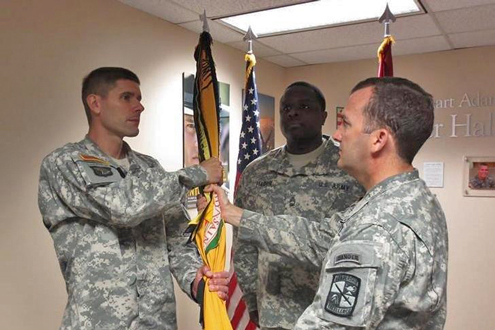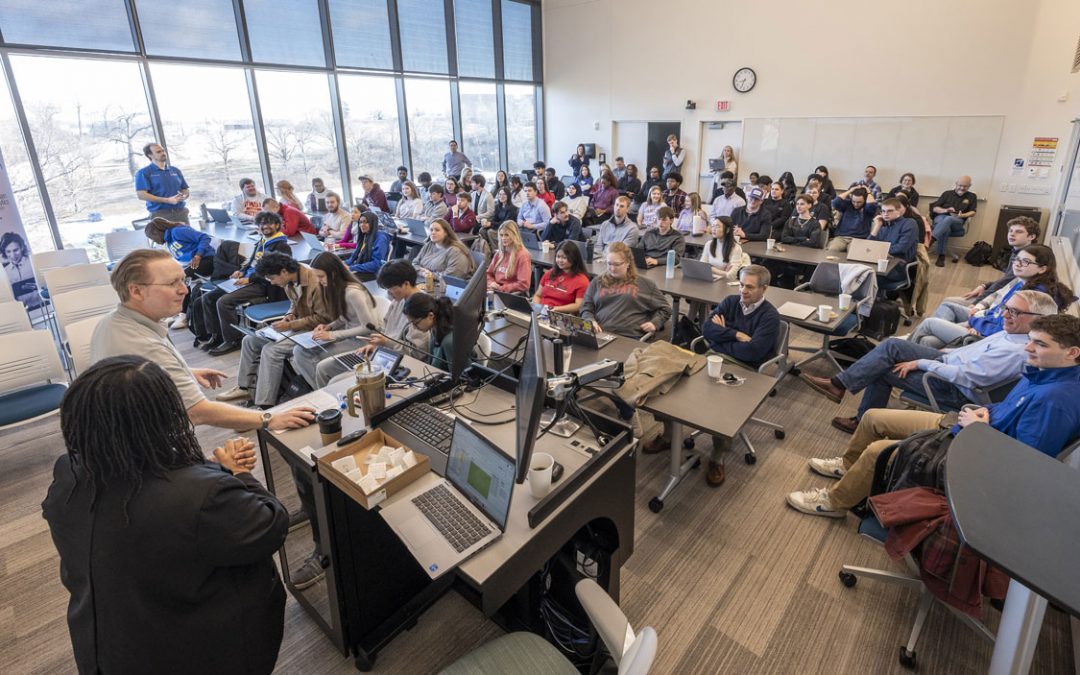
Lt. Col. James Craig (right) passes the unit colors to Lt. Col. David Waters (left) as Master Sgt. Leondra Felder looks on. Waters is the new commander of the St. Louis Army ROTC Gateway Battalion, which includes ROTC students at UMSL and several other St. Louis-area colleges and universities.
The St. Louis Army ROTC Gateway Battalion has a new commander. Lt. Col. David Waters has taken over the post previously held by Lt. Col. Jim Craig, who is transitioning to the position of associate teaching professor and chair of the new Department of Military Affairs and Veteran Studies at the University of Missouri–St. Louis.
“It’s good to have someone come in and take a fresh look,” Craig said of Waters. “There’s a point when you need to hand over leadership and Lt. Col. Waters is the right guy, academically sound, solid as can be in terms of military skills.”
The ROTC Gateway Battalion is based at Washington University in St. Louis and also includes ROTC students from UMSL, Saint Louis University, Lindenwood University, Fontbonne University, Harris-Stowe State University, Missouri Baptist University, St. Louis College of Pharmacy, Maryville University, Chamberlain College of Nursing and Webster University.
Waters, an Illinois native, enlisted in the Army at the age of 17 while still in high school, saying at the time he was mature enough to know he was too immature for college and needed to do something like go into the Army. After a two-year tour of duty that included Desert Storm, he went to the University of Illinois at Urbana–Champaign on the GI Bill, where he joined U of I’s ROTC battalion with intent to go back into active duty after graduation.
Waters said that not long after beginning college, he realized he missed the military, its camaraderie and leadership. He cited one incident in particular that occurred during Desert Storm that stayed with him long after and influenced him to eventually become a commissioned officer.
Waters, 18 years-old at the time, and his platoon, comprised mostly of other teenagers, had been stationed in Saudi Arabia for several months when they finally got the orders to start preparing for an air assault raid against Iraqi forces. The raid would involve being dropped off by helicopter in an area from where — hopefully — a surprise attack could be launched. But while preparing for this mission, Waters’ squad leader froze up.
“We all saw the look on his face, how scared he was and pretty soon my squad was what we call combat ineffective,” Waters said. “But then our lieutenant came in and immediately saw what was happening, he relieved the squad leader and got us back on track. You read about leadership in combat but experiencing it was inspiring. After seeing that, I knew that becoming an officer was something I really wanted to do.”
After earning a bachelor’s degree, Waters served two tours in Iraq and after commanding two infantry companies, earned a master’s degree in public administration from Harvard University in Cambridge, Mass., served in Afghanistan, and held teaching positions at the United States Military Academy at West Point, N.Y. In addition to serving at the ROTC Gateway Battalion commander, he now serves as the chair of Military Science at Washington University in St. Louis.
Just as his experience with his platoon leader in Desert Storm imparted on Waters a strong sense of leadership, Waters hopes to pass on the fundamentals of leadership to the cadets of the Gateway ROTC Battalion. The battalion is unique among the nation’s ROTC programs in that it is a conglomeration of nine area universities, including UMSL. The cadets, led by a cadet battalion commander, are charged with running the program, and the multicampus system means that these cadets will have to coordinate while not necessarily seeing each other every day or having the luxury of living in the same campus housing.
“The benefit though is that’s how we’re often spread out across the modern battlefield,” Waters said. “You might be a company commander but have three platoons in three different outposts and they can be significant distances away, or they might be close on a map but still up on a mountain.”
Though Waters is still settling into his position, one thing he is certain of is he’d like to see the student body, in general, more involved with the program, even those not necessarily interested in joining the armed forces.
“The military’s a big part of our foreign policy,” Waters said. “But if you look at the number of representatives and senators who have military experience, it’s low. Even if you have no interest in becoming a commissioned officer, I would like to think that some people might be interested in the program just so they understand a few basics about what the military is supposed to do, what it can do.”
Reflecting on this point further, Waters quoted the ancient Greek thinker Thucydides: “The state that separates its scholars from its warriors will have its thinking done by cowards and its fighting by fools.”














